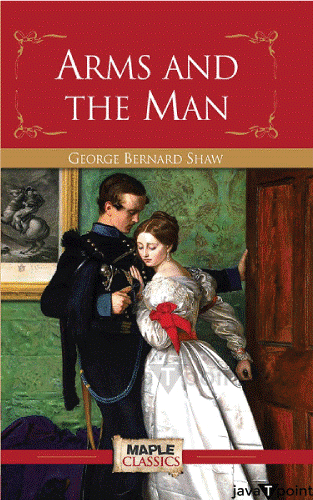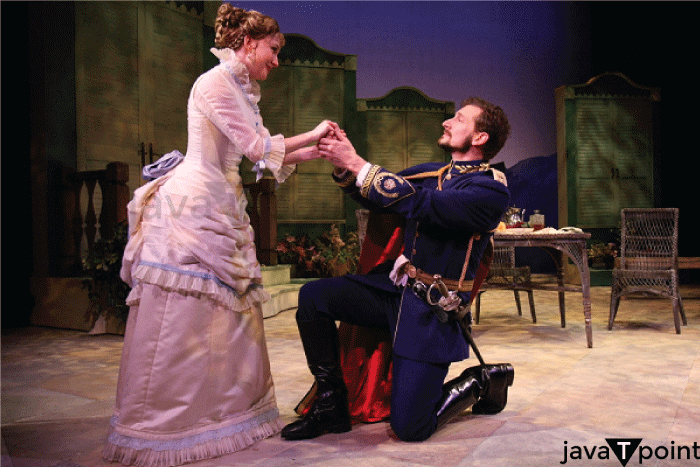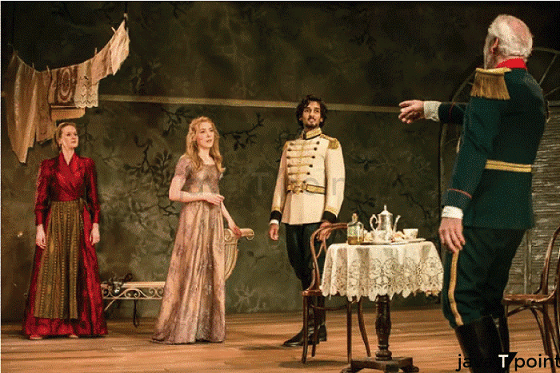Arms and the Man SummaryThe comic play "Arms and the Man" was written by George Bernard Shaw. It was initially staged in 1894 and is based on events during the Serbo-Bulgarian War in the late 19th century. The play examines the themes of idealism vs. reality, love, and war. Shaw criticizes societal norms and idealized views of war with witty speech and satire. The narrative's protagonist is a young Bulgarian woman named Raina Petkoff, who romanticizes battle and idolizes her future husband, the military hero Sergius Sarnoff. The pragmatic Swiss mercenary Captain Bluntschli, who seeks safety in Raina's bedroom after fleeing the battlefield, challenges Raina's worldview. After this encounter, Raina is forced to consider her values and face the discrepancy between romanticized ideas and the harsh reality of war. The drama also explores issues of social class and gender norms as difficulties arise in the Petkoff home due to Raina's friendship with Captain Bluntschli and the employment of Louka, a lower-class maid. The protagonists deal with the intricacies of love, loyalty, and personal development as the plot develops; this challenges their preconceptions and finally exposes the shortcomings and contradictions in their romanticized beliefs. Shaw's "Arms and the Man" exhibits his trademark wit and astute social satire, exposing the absurdities and hypocrisies of society while providing a light-hearted and provocative look at human nature. Act 1The primary characters of "Arms and the Man" are introduced in the first act, laying the groundwork for the subsequent confrontations. During the Serbo-Bulgarian War, the crime is committed in the Petkoff family's Bulgarian home. Young and idealistic Bulgarian woman Raina Petkoff talks to her maid Nicola about her romanticized ideas of war in the play's first scene. Sergius Saranoff, Raina's fianc�, is a cavalry officer fighting on the front lines, and she is anxiously awaiting his homecoming. A Swiss mercenary named Captain Bluntschli suddenly breaks into Raina's bedroom, looking for safety after fleeing the conflict. Startled but interested, Raina hides Captain Bluntschli and starts talking to him. While Captain Bluntschli is forthright in expressing his pragmatic and critical viewpoint on the battle, she exposes her idealized perspective on war, finding it heroic and honourable. Raina's mom, Catherine Petkoff, walks in while she and Captain Bluntschli speak. A succession of funny and tense scenes results from Raina's desperate attempts to hide Captain Bluntschli's presence. Catherine continues to talk about the war and her husband, Major Petkoff, while completely unaware of the circumstances. 
Raina successfully conceals Captain Bluntschli in her closet to complete the charade as Catherine and Raina leave the room without noticing the stranger concealed a few feet away. The troubles and secrets that will surface in the next acts are put in motion by this. Act 1 of "Arms and the Man" introduces the opposing views on war that Captain Bluntschli and Raina have. The idealism of Raina is established, and the comic tension brought on by Captain Bluntschli's sudden entry into Raina's bedroom is also established. The play's first act also hints at how class factors and societal norms will affect the tensions and relationships addressed throughout the play. Act 2The struggles and connections between the characters are expanded upon in "Arms and the Man"'s second act. Still taking place during the Serbo-Bulgarian War, it is set in the Petkoff home. The play's first scene features Raina's fianc� Sergius Saranoff's triumphant homecoming after leading a cavalry attack. Raina greets Sergius with enthusiasm, but there is tension in their exchange since Sergius seems more preoccupied with the admiration he has garnered than with his real combat exploits. After feeling bad about keeping Captain Bluntschli in her room, Raina confides with Sergius about the incident. Sergius disregards it as a non-issue and cannot see the gravity of the circumstance. As Raina comprehends Sergius' conceit and ignorance, her idealistic view of him as a hero starts to disintegrate. In the meantime, Raina learns that Sergius has been making out with Louka, a housemaid. This information strains Raina's friendship with Sergius and deepens her disappointment. The play also explores Louka's connection with Nicola, the older servant, who has her own provocative and covert interactions. The suspense increases when Nicola, the obedient servant, tells Raina that he has discovered a Serbian officer's coat, suggesting Captain Bluntschli's escape. Raina is aware of the possible repercussions if Captain Bluntschli's existence is discovered, and the act concludes with her decision to protect him at all costs. Act 2 of "Arms and the Man" intensifies the confrontations and exposes Raina's romantic perception of Sergius and conflict. The play examines infidelity issues, the contrast between appearances and truth, and the intricate relationships between various socioeconomic groups. As the characters' connections deepen and their true selves are revealed, it prepares the audience for greater disclosures and conflicts in the subsequent acts. Act 3The third act of "Arms and the Man" is set at the Petkoffs' home and continues the intertwined conflicts and reveals the characters' unspoken secrets. Raina and Catherine set the stage for the act by preparing for significant visitors. Raina is adamant about keeping Captain Bluntschli, who is pretending to be a Serbian officer, hidden. To keep him concealed, she enlists Nicola's assistance. Major Petkoff and Sergius are among the visitors now, and Raina has the difficult task of keeping Captain Bluntschli's presence hidden while keeping her composure. The tension increases when Sergius starts to wonder about Raina's secret and grows envious of her contacts with the enigmatic Serbian commander. Raina can redirect Sergius' focus throughout the incident and successfully conceal Captain Bluntschli. Louka, the maid, learns Raina's secret and tries to influence the situation for her gain, which causes problems. Sergius learns from Louka that Raina has been shielding the Serbian officer to stir up trouble in the Petkoff home. When Sergius challenges Captain Bluntschli, everyone knows Raina's true motivations. As a result of Sergius' actions and duplicity, Raina becomes disillusioned and rejects the idealized beliefs they formerly held. The covert romance between Catherine and Captain Bluntschli is revealed in the final act, further complicating the situation. The character tensions reach their height, paving the way for more discoveries and conclusions in the final act. 
The tension in "Arms and the Man" is increased in Act 3, and the secrets accumulating throughout the play are revealed. Themes of deception, betrayal, and the effects of clinging to idealized ideals are all explored. The act paves the way for the conclusion and transformation that will take place in the final act by exposing the characters' shortcomings and challenging their idealized conceptions of love and war. Act 4The fourth and concluding act of "Arms and the Man" resolves the conflicts and shows the characters' transformational journeys. Following the disclosures and conflicts of the previous act, it takes place in the Petkoff home. Raina confronts Sergius about his infidelity and hypocritical actions in the play's first scene. Raina seeks honesty and authenticity in their connection and communicates her frustration with their glorified ideas. After being taken aback at first, Sergius is enthralled by Raina's newfound courage and sincerity. Returning to the Petkoff home, Captain Bluntschli reveals he is a Swiss mercenary as he reveals Catherine's covert infatuation with him, his homecoming leads to many discoveries. When Catherine faces her behavior's consequences, she begins reassessing her priorities. Louka confesses her affection for Sergius and her goal for social improvement. Sergius decides to call off his engagement to Raina and pursue a relationship with Louka as a result of seeing Louka's genuineness and genuine passion. Major Petkoff expresses his resignation to the changes and accepts the reality of the circumstances as the Petkoff family struggles with the truth. The characters make decisions consistent with their newly discovered self-awareness as the act ends by admitting the shortcomings in their romantic conceptions of love and society. The drama comes to a peaceful and gracious conclusion. Raina resolves to pursue a real relationship with Captain Bluntschli after letting go of her delusions and embracing his pragmatism. Sergius and Raina agree to split ways peacefully because they realize their union is based more on idealized notions than compatibility. Humbled by her deeds, Catherine makes amends with Major Petkoff and strives to mend their friendship. The moral of the act and the play is that real love and personal development result from accepting reality and letting go of unrealistic ideals. The tensions and character arcs in "Arms and the Man" are resolved in Act 4, which challenges idealized notions and emphasizes the value of honesty and self-discovery. While leaving room for thought on the intricacies of human nature and the shortcomings of societal expectations, it brings the play to a happy end. The setting of The Petkoff Family and the Serbo-Bulgarian War"Arms and the Man" is primarily situated in the Serbo-Bulgarian War's historical backdrop and the Petkoff household. The Serbian War in BulgariaThe Serbo-Bulgarian War, which took place in the latter part of the 19th century, is when the play is set. The play's actions and themes are set against the backdrop of this conflict. The conflict between the Bulgarian and Serbian soldiers and romantic conceptions of bravery and heroism characterize the battle. The Petkoff FamilyMost of the action takes place at the Bulgarian home of the Petkoff family. The family unit is a microcosm of society, representing different social strata, norms, and ideals. The Petkoff family is portrayed as wealthy and upper-class, and their home is shown to be well-to-do. It provides a backdrop for character interactions, conflicts, and disclosures. Different rooms and locations are used within the Petkoff home, including Raina's bedroom, where Captain Bluntschli seeks refuge, and the formal event in Act 3, where social dynamics and tensions reach their pinnacle. 
The contrast between the supposedly elegant interior of the Petkoff home and its battle-torn exterior draws attention to the difference between idealized ideas of war and the realities of ordinary living. The Serbo-Bulgarian War and the Petkoff home are the backdrops for investigating themes relating to conflict, love, cultural norms, and the discrepancies between idealized ideals and brutal realities. Idealism and Disillusionment About Raina PetkoffOne of the main characters in "Arms and the Man" is Raina Petkoff. Throughout the play, she experiences a dramatic journey from idealism to disillusionment, testing her romanticized ideas and deepening her grasp of reality. IdealismAt first, Raina is shown as a romanticizing idealistic young woman who romanticizes combat and bravery. She admires Sergius Saranoff, her fiance, and believes that war is an honourable and noble pursuit. Raina's romantic nature is seen in her devotion to romanticized ideas and her observance of social norms. DisillusionmentThe arrival of Captain Bluntschli, a practical Swiss mercenary, tests Raina's ideological outlook. Raina is forced to confront the reality of war and the contrast between romanticized ideas and the realities of existence due to her interaction with Captain Bluntschli. She starts to doubt that war is a noble and glamorous endeavor and the heroism she had previously connected with Sergius. Evolution and ChangeRaina's disappointment grows as the play continues, resulting in her inner development and transformation. Raina learns more and more about the cultural norms' hypocrisy and shallowness, especially in her relationship with Sergius. She challenges the romanticized notions she once believed by demanding honesty and authenticity in her interactions. Independence and Self-EfficacyRaina's disappointment finally gives her the strength to reject societal norms and chart her course. She chooses to connect with Captain Bluntschli over Sergius and his phony romanticism in favour of a more real and practical relationship. Pragmatism Amidst Romanticized Notions of WarIn "Arms and the Man," Captain Bluntschli represents realism amidst the romanticized ideas of battle throughout the play. He stands in stark contrast to the romanticized notions of bravery and heroism that are often connected with combat. Realistic and PracticalityA Swiss mercenary named Captain Bluntschli gives the drama a down-to-earth and genuine viewpoint. By focusing on the practicalities of survival and the significance of strategy and self-preservation, he undermines the romanticized ideas of combat. Bluntschli focuses more on the Practicality of remaining alive and achieving his goals than on honor or glory. Romanticized Notions ReviewsGeorge Bernard Shaw criticizes the glorified ideas of war that were widespread at the time through Captain Bluntschli, a character in his play. In exposing the harsh reality of war, Bluntschli draws attention to the gap between society's lofty ideals and what troops experience on the front lines. He undermines the idea of heroic bravery and places a greater emphasis on realism and flexibility. Contrary to ExpectationsBy presenting a character who defies conventional hero clich�s, Captain Bluntschli's portrayal subverts the audience's expectations. By emphasizing survival and ingenuity more than heroic deeds, he undermines the notion of bravery and heroism. Because of Bluntschli's pragmatism, people in the audience are forced to think critically about the heroization of troops and the glorification of war. Impact on Other CharactersThe play's other characters, especially Raina, are significantly impacted by Captain Bluntschli's realism. Raina's experience with Bluntschli shatters her romantic ideas about war and exposes her to its realities. Raina is transformed as a result of Bluntschli's influence, which challenges her romanticized ideas and aids in the development of a more nuanced and realistic viewpoint. Shaw emphasizes the need to rethink and reevaluate the glorification of war and the glorified ideals that frequently obscure our knowledge of its realities by depicting Captain Bluntschli as a realistic character amidst the romanticized concepts of war. Bluntschli's viewpoint urges the viewer to weigh the real-world effects and ramifications of conflict rather than relying simply on romanticized conceptions of bravery and heroism. Infidelity, Conceit, and Heroism of Sergius SaranoffSergius Saranoff, a pivotal figure in "Arms and the Man," personifies a complicated brew of bravery, conceit, and adultery. George Bernard Shaw examines the paradoxes and shortcomings of idealized aspirations as well as the effects of giving in to selfish wants through the character of Sergius. Heroic Vanity and ImageAt first glance, Sergius presents as a fearless and captivating character who is praised for his bravery in battle. He feeds on the adoration and attention that come with the glorified idea of being a military hero. Sergius's exaggerated displays of courage and his need for approval and admiration are clear signs of his conceit and self-importance. Infidelity and HypocrisyDespite being engaged to Raina, Sergius flirts and gives in to his cravings, showing that he is unfaithful. Since Sergius loves the rush of romantic conquests while demanding loyalty and fidelity from others, his actions expose his hypocrisy. His relationship with the maid Louka reveals the contrast between his idealized portrayal of a brave hero and his real actions. Contrast to PracticalityThe pragmatic and practical nature of Captain Bluntschli is contrasted with Sergius's persona. Sergius is more concerned with upholding his heroic reputation and pursuing his objectives, regardless of the consequences, whereas Bluntschli emphasizes survival and Practicality. Sergius is oblivious to the realities of relationships and the effects of his actions on others because of his romanticized aspirations and self-centeredness. Development and IntrospectionSergius experiences personal growth and self-reflection throughout the play. Sergius is forced to face his shortcomings and the discrepancy between his idealized self-perception and his behavior due to the revelations and conflicts within the Petkoff household. He is forced to reevaluate his goals and wonder if he is adhering to cultural norms due to his connection with Louka and the consequences of his infidelity. Sergius Saranoff's persona symbolizes the intricacies of human nature, exposing the paradoxes and weaknesses in people seduced by idealized ideals. Shaw challenges the idea that bravery and nobility are essential virtues by critiquing the results of indulgence in vanity and self-centered wants. The audience is inspired by Sergius's journey to consider the value of self-reflection, personal development, and the necessity of aligning actions. ConclusionIn conclusion, George Bernard Shaw's "Arms and the Man" is a satirical play that ridicules idealized conceptions of conflict, love, and social norms. The play, set during the Serbo-Bulgarian War, examines the struggles and changes that occur to its protagonists. As she hides the realistic Swiss mercenary Captain Bluntschli in her apartment, Raina Petkoff, the idealistic young woman, deals with the reality of war and love as she learns that her fianc�, Sergius Saranoff, is having an affair with the maid, Louka, her disillusionment increases. The characters in the play struggle with their shortcomings and hypocritical tendencies as they negotiate the complexities of their relationships. As Raina confronts Sergius about his infidelity and demands honesty in their relationship, her romanticized illusions come crashing down. Captain Bluntschli discloses his real identity and Catherine's covert relationship as the truth comes to light. Characters must face their delusions and make decisions consistent with their newly discovered self-awareness. In the end, Raina gives up her fantasies and accepts Captain Bluntschli's realism, while Sergius pursues a romance with Louka. Major Petkoff and Catherine make up when Catherine accepts the results of her actions. The play's resolution emphasizes accepting honesty, facing reality, and letting go of romantic ideals. Shaw's razor-sharp wit and social critique make us wonder about societal expectations and the paradoxes of human nature. The timeless novel "Arms and the Man" exposes the follies of war and romance and provokes us to consider the intricacies of interpersonal relationships and the pursuit of true meaning and love. |
 For Videos Join Our Youtube Channel: Join Now
For Videos Join Our Youtube Channel: Join Now
Feedback
- Send your Feedback to [email protected]
Help Others, Please Share









